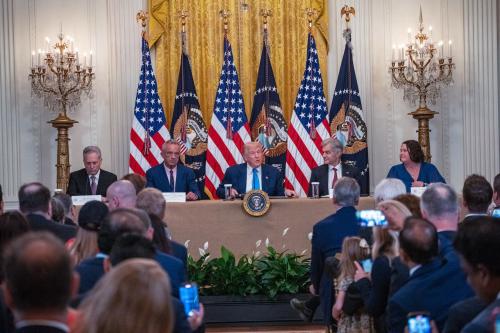While pharmaceutical companies’ agreement to lower the prices of some anti-AIDS drugs is good news, it promises little relief to the vast majority of with AIDS, who live in countries with governments unable to buy these drugs even at the reduced prices. And even if the price were zero, weak health infrastructure and low levels of education would make widespread effective use of the anti-AIDS drugs difficult, as they require complicated regimens of dosage and control.
The best long-run solution for AIDS and the other infectious diseases devastating poor countries is vaccines: they would be relatively easy to deliver and could be used by large numbers of people at low cost. But little money has been committed to developing such vaccines. Last month, a task force established by Britain’s prime minister, Tony Blair, proposed a plan that might make new vaccines a reality.
The need for vaccines is most urgent for H.I.V., the virus that causes AIDS, which newly infected more than five million people last year (70 percent of them in Africa); tuberculosis, which kills 1.7 million people a year and is spreading in drug-resistant forms; and malaria, which kills one million a year—mainly infants, toddlers and pregnant women.
Because drug companies see little chance of recouping their costs, they undertake very little research on diseases that primarily affect poor countries. Of the 1,223 drugs licensed between 1975 and 1987, only 13 were for tropical diseases. Two of these were modifications of existing medicines, two were produced for the United States military and five came from veterinary research. Only four were developed by commercial pharmaceutical firms specifically for tropical diseases in humans.
The British task force has proposed that the industrialized nations stimulate research by committing to purchase effective vaccines, when they are developed, for malaria, tuberculosis and H.I.V. If other nations take up this challenge, not only will the incentive be in place for vaccine development, but price will not be a barrier to people using the vaccines.If a commitment to purchase new vaccines fails to induce their development, it will have cost nothing; if it succeeds, it will save millions of lives at a few dollars each. For example, if the donor countries agreed to purchase a malaria vaccine at $5 a dose, the vaccine could protect the 50 million newborns and pregnant women at highest risk from the disease for $250 million a year. Markets of this size have proved sufficient to stimulate vaccine research in the past. And the government sponsors would not have to choose between competing research proposals—something much better left to the private sector.
The more quickly action is taken, the sooner the world will have more of the weapons it needs against disease.
The Brookings Institution is committed to quality, independence, and impact.
We are supported by a diverse array of funders. In line with our values and policies, each Brookings publication represents the sole views of its author(s).



Commentary
Op-edCreating a Market for Vaccines
June 1, 2001